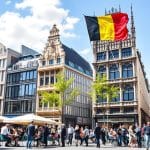Belgium is a great option if you are looking for a business-friendly country with a rich culture. Read on to discover what cultural differences you may experience in Belgium’s business landscape.

Belgium is a small country with a $599.11 billion GDP growth and a favorable business climate. It is a member of the European Union and the Eurozone, and has a strategic location in the heart of Europe. Belgium is also a significant exporter of cars, vaccines, diamonds, pharmaceuticals, and chemicals.
If you are considering doing business in Belgium, you should keep a few things in mind. The business culture in Belgium is generally polite, efficient, and pragmatic. Belgians are known for their attention to detail and their commitment to quality. They are also known for multilingualism, making it easy to do business in Belgium.
If you can overcome some primary cultural challenges, doing business in Belgium can be a rewarding experience. Keep reading to learn Belgium’s cultural and business statistics, a gateway to the European market.
Quick Belgium Stats
| GDP | $599.11 billion |
| GDP per capita | $51,849 |
| Population | 11.6 million |
| Currency | Euro (EUR) |
| Capital | Brussels |
| Major trading partners | Germany, France, Netherlands, United Kingdom, United States |
| Top exports | Cars, vaccines, diamonds, pharmaceuticals, chemicals |
| Top imports | Machinery, fuels, chemicals, food, textiles |
| Unemployment rate | 6.4% |
| Inflation rate | 3.2% |
| Corporate tax rate | 25% |
| VAT rate | 21% |
Language

It is important to be aware of the language differences in Belgium when doing business in the country. Belgium is a bilingual country with three official languages: Dutch, French, and German. However, the most commonly spoken languages in the workplace are Dutch and French.
Flemings: The Flemish are the majority population in Belgium and speak Dutch. Dutch is the most commonly spoken language in the workplace in Flanders, the northern region of Belgium.
Walloons: The Walloons are the minority population in Belgium and speak French. French is the most commonly spoken language in the workplace in Wallonia, the southern region of Belgium.
Dutch and French are the official languages in the capital city of Brussels. However, English is also widely spoken in Brussels, especially in business.
If you are not fluent in Dutch or French, try to learn some basic phrases. You should also be prepared to use a translator if necessary.
Here is a table of the language percentages in Belgium:
| Language | Percentage of Population | Region |
| Dutch | 60% | Flanders |
| French | 30% | Wallonia |
| German | 1% | Eastern Belgium |
| English | 10% | National |
Basic Business Culture
A strong focus on work-life balance, a commitment to quality, and a respect for hierarchy characterizes business and work culture in Belgium. Belgians generally enjoy an effective work-life balance, with a minimum of four weeks of paid vacation per year. They are also known for their punctuality and attention to detail. In the workplace, Belgians tend to be more formal than in some other countries, and they value hierarchy and respect for authority.
Here are some different working styles of Belgian people:
- Flemish: Flemish people are more egalitarian and results-oriented than Walloons. They prefer a flatter hierarchy with more opportunities for input and decision-making from all levels of the organization. They are also more direct and unafraid to speak their minds, even if it means disagreeing with their boss or colleagues.
- Walloon: Walloons are more comfortable with a traditional top-down hierarchy. They are more concerned with building relationships and creating a positive work environment. They are also more indirect and prefer to avoid conflict.
Here are some specific things to expect when working in Belgium’s work culture:
- Meetings will be well-organized and efficient. Belgians do not waste time, so meetings will typically start and end on time. There will also be a clear agenda, and everyone will be expected to participate.
- Decision-making will be consensus-based. Belgians value collaboration and consensus, so a single person will not make decisions. Instead, there will be a lot of discussion and input from everyone involved.
- Communication will be direct and honest. Belgians are fearless in speaking their minds, even if it means disagreeing with someone. They also value clear and concise communication.
- Work-life balance is important. Belgians value their free time, and they expect to be able to leave work at a reasonable hour. They also expect to be able to take vacations and time off when they need to.
Work Timings

The Belgian government has embraced the EU Working Time Directive, which restricts individuals to a maximum workweek of 48 hours. In Belgium, a typical workday commences at 8:30 or 9:00 a.m., concluding at 5:30 or 6:00 p.m. This consistent framework accommodates the diverse needs of employees while ensuring operational efficiency.
The workweek structure in Belgium is designed to accommodate diverse professional roles, varying levels of seniority, and the specific needs of different companies. Most employees find themselves engaged in their tasks for either four or five days each week. Instances of overtime in Belgian workplaces are infrequent, with such scenarios typically reserved for exceptional circumstances, such as unforeseen emergencies or crises.
Communication
When initiating your first communication with colleagues or business contacts in Belgium, opting for email is a suitable medium. Begin with a courteous and concise subject line, followed by a polite greeting and introduction—express interest in connecting and collaborating. Always maintain a respectful tone and adhere to formalities, as Belgian business culture values professionalism.
Expect a timely response, usually within a few days. While third-party introductions aren’t obligatory, they can facilitate a smoother initial interaction. Remember, politeness and proper etiquette are essential throughout.
Greetings

In Belgian work culture, greetings are essential and reflect respect and professionalism. A polite handshake, direct eye contact, and a warm smile are customary when meeting colleagues or clients. Addressing them by their last name followed by “Mr.” or “Ms.” is common until a more informal relationship develops. As interactions progress, Belgians often switch to a more casual greeting like “Bonjour” (French) or “Goedemorgen” (Dutch), followed by the person’s first name.
Here’s what to always keep in mind:
Shake hands firmly and make eye contact. This is the standard professional greeting for both men and women.
Use the person’s full name unless they have specifically told you to use their first name. In Belgium, it is considered politer to use the formal “vous” rather than the informal “tu” until you have established a close relationship with the person.
Say “enchanté(e)” or “aangenaam” (meaning “nice to meet you”). These are the standard greetings in French and Dutch, respectively.
If you meet someone for the first time in a formal setting, you may also want to kiss them thrice. This is the traditional greeting in Belgium, but it is becoming less common in urban areas.
Belgians value punctuality, so arriving on time for meetings or appointments is crucial. Additionally, small talk before diving into business matters helps build rapport. A friendly “How was your weekend?” or “Did you have a good trip?” sets a positive tone. Being attentive and respectful in these initial greetings fosters a harmonious and effective work environment in Belgian workplaces.
Gift Policy

Gifts can be an excellent way to show appreciation or build good relationships. In some places, sending gifts to colleagues or clients is common. But in Belgium, things are a bit different when giving gifts at work. Here’s what you should keep in mind:
Giving gifts might make your coworkers or business partners feel uneasy.
You can do so if you still want to share a small gift from your home country. Just remember to choose something straightforward enough. Also, avoid putting your company logo or business card on the gift.
Meetings
In Belgium’s work culture, meetings are conducted primarily in Dutch, French, or occasionally English, reflecting the country’s linguistic diversity. The choice of language often depends on the region and the participants’ preferences. Meetings in the Flemish north are more likely to be in Dutch, while those in the Walloon south will likely be in French. English is commonly used in international business settings.
A collaborative and consensus-driven approach characterizes the meeting style in Belgium. Discussions are often exploratory, with an emphasis on open problem-solving and brainstorming. Belgian professionals value input from all team members and appreciate well-thought-out suggestions and ideas.
To respond effectively in Belgian meetings, it’s essential to participate and contribute your thoughts actively. Engage in respectful debates, focusing on logical arguments and well-structured points. It’s acceptable to voice dissenting opinions but always maintain a courteous tone. Address colleagues by their professional titles, and when conversing in English, be aware of potential language barriers.
Non-verbal cues like maintaining eye contact and nodding in agreement demonstrate engagement. After the meeting, consider sending a follow-up email summarizing key points and your commitment to the discussed tasks.
Dress Code
In Belgian work culture, dressing is typically smart and professional. Men often wear suits or dress trousers paired with dress shirts and ties. Women opt for business attire such as dresses, blouses, skirts, or pantsuits. Neutral colors and conservative styles are favored. It’s important to avoid overly casual or flashy outfits.
Business-casual attire is acceptable in some workplaces, but it’s advisable to err on formality. Adhering to a well-groomed appearance and respecting the workplace’s formality contribute to a positive impression in the Belgian professional environment.












